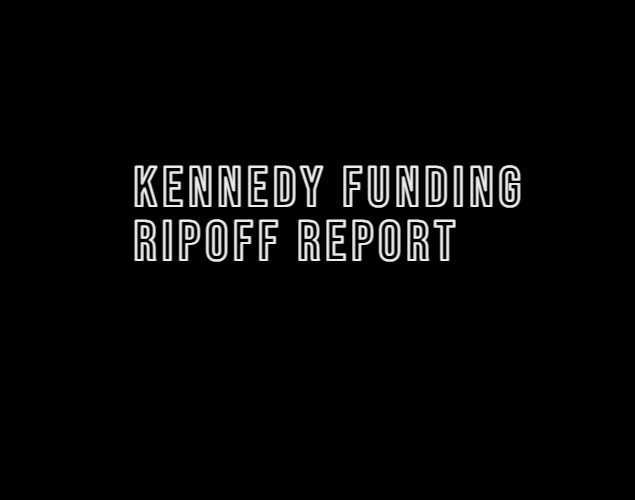Kennedy Funding Ripoff Report: Real Risks or Overblown Complaints?

Kennedy funding ripoff report is a private, non-bank lender specializing in hard-money and bridge loans—financing solutions designed for quick funding and often for complex real estate ventures. Its appeal lies in speed and flexibility, attracting borrowers who may not qualify for traditional bank loans. However, the company’s reputation has been clouded by what many call the “Ripoff Report,” a collection of online complaints alleging hidden fees, shifting terms, and poor communication.
The Plot: What Borrowers Are Saying
Over the years, borrowers have voiced a range of grievances:
-
Hidden or unexpected fees — including origination charges, due diligence fees, and high interest rates that borrowers claim were not made clear upfront.
-
Last-minute changes to loan terms — some customers report that conditions outlined in the final loan agreement differ from what they expected.
-
Poor customer service — slow responses, lack of support during processing, and minimal guidance when deals fall apart.
-
Aggressive foreclosure tactics — as is common with private lenders, some borrowers say repayment demands come swiftly and without much flexibility.
These complaints, often emotionally charged, have fueled the perception that Kennedy Funding operates in a way that disadvantages borrowers.
Legal and Regulatory Context
Despite the negative buzz, there is no confirmed record of federal regulatory enforcement or formal legal findings of fraud against Kennedy Funding. While there have been lawsuits involving contractual disputes—such as disagreements over collateral terms—courts have generally treated these as commercial disagreements rather than outright misconduct. This suggests that while customers may feel wronged, the issues often fall within the bounds of private lending practices.
What Kennedy Funding Says in Response
Kennedy Funding disputes the characterization of being a “ripoff,” pointing to several factors:
-
Letters of Intent (LOIs) are preliminary documents, not binding loan commitments. They outline potential terms but are contingent on due diligence and underwriting approval.
-
Upfront due diligence fees—for appraisals, legal reviews, and background checks—are standard in the industry and non-refundable because the work is completed regardless of whether the loan closes.
-
All loan terms and fees are disclosed in writing before finalization, though borrowers may not always fully grasp the implications.
From the company’s perspective, many complaints arise when a deal fails to close and borrowers, frustrated by sunk costs, feel they were misled.
Industry Context: Typical or Troubling?
Private lenders like Kennedy Funding operate under a different model than banks:
-
Faster approvals and funding — sometimes in a matter of days.
-
Flexible deal structures — enabling financing for unconventional or high-risk projects.
-
Higher costs — including interest rates often between 9% and 18%, plus substantial origination and due diligence fees.
-
Shorter terms — loans typically last 6 to 24 months, requiring a clear repayment strategy.
These characteristics mean that while such loans can be a lifeline for certain projects, they are inherently riskier and more expensive. Borrowers unfamiliar with this landscape may see industry-standard practices as unfair or predatory.
Broader Perspective: Are Complaints Fair?
Looking at the big picture, several patterns emerge:
-
Misunderstanding the LOI — Some borrowers interpret a Letter of Intent as a guaranteed loan approval, leading to disappointment when underwriting declines the deal.
-
Fee disputes — Non-refundable fees are common, but if not fully understood, they can feel like a bait-and-switch.
-
Emotional reactions — Many online complaints are subjective, focusing on frustration rather than provable misconduct.
-
Legitimate concerns — That said, some borrowers may indeed encounter opaque communication or terms that are technically disclosed but poorly explained.
In short, the complaints often stem from a mix of legitimate frustrations and the inherent risks of private lending.
Borrower Voices: Reality from the Ground
In real estate investor circles, kennedy funding ripoff report is often described as a legitimate but high-cost lender. Experienced borrowers caution that it is best suited for those who:
-
Have substantial collateral,
-
Understand the mechanics of private lending, and
-
Can handle short-term repayment timelines without relying on extensions.
First-time borrowers or those with limited resources may be more likely to feel overwhelmed by the process and costs.
What Should Borrowers Do?
For those considering Kennedy Funding—or any hard-money lender—it’s critical to proceed with preparation and caution.
| Step | Why It Matters |
|---|---|
| Read every document thoroughly | Understand the LOI, the fee structure, and the final loan terms before signing. |
| Ask about every fee | Determine which fees are refundable, when they are due, and what they cover. |
| Plan an exit strategy | Have a clear repayment plan—through refinancing, property sale, or other means—before committing. |
| Compare offers | Evaluate multiple lenders to ensure competitive terms and avoid overpaying. |
| Get professional advice | A real estate attorney or experienced broker can spot problematic clauses and clarify your obligations. |
Final Verdict: Not a Scam, but Not for Everyone
The “Ripoff Report” label may be too simplistic for the Kennedy Funding story. The company is a long-standing player in the private lending space, offering fast, flexible funding for complex deals. For experienced investors who understand the trade-offs, Kennedy Funding can be a useful partner.
However, its model is not designed for casual or uninformed borrowers. The high costs, non-refundable fees, and strict repayment terms can quickly become overwhelming if expectations are not aligned from the start.
In the end, Kennedy Funding’s reputation depends heavily on borrower preparedness. Those who do their homework, read the fine print, and enter the deal with a clear repayment plan are less likely to feel “ripped off” and more likely to view the company as a valuable—if expensive—resource in the world of private finance.
Conclusion
The controversy surrounding Kennedy Funding highlights a core truth about private lending—it can be both a powerful tool and a costly trap. While the company operates within legal bounds and delivers on its promise of fast, flexible financing, its high fees, non-refundable costs, and strict terms mean it is not a one-size-fits-all solution.
Borrowers who thrive with Kennedy Funding are typically experienced investors who enter the process with full awareness of the risks, a strong repayment plan, and a willingness to pay for speed and flexibility. Those who rush in without understanding the fine print are far more likely to feel misled or disappointed.




